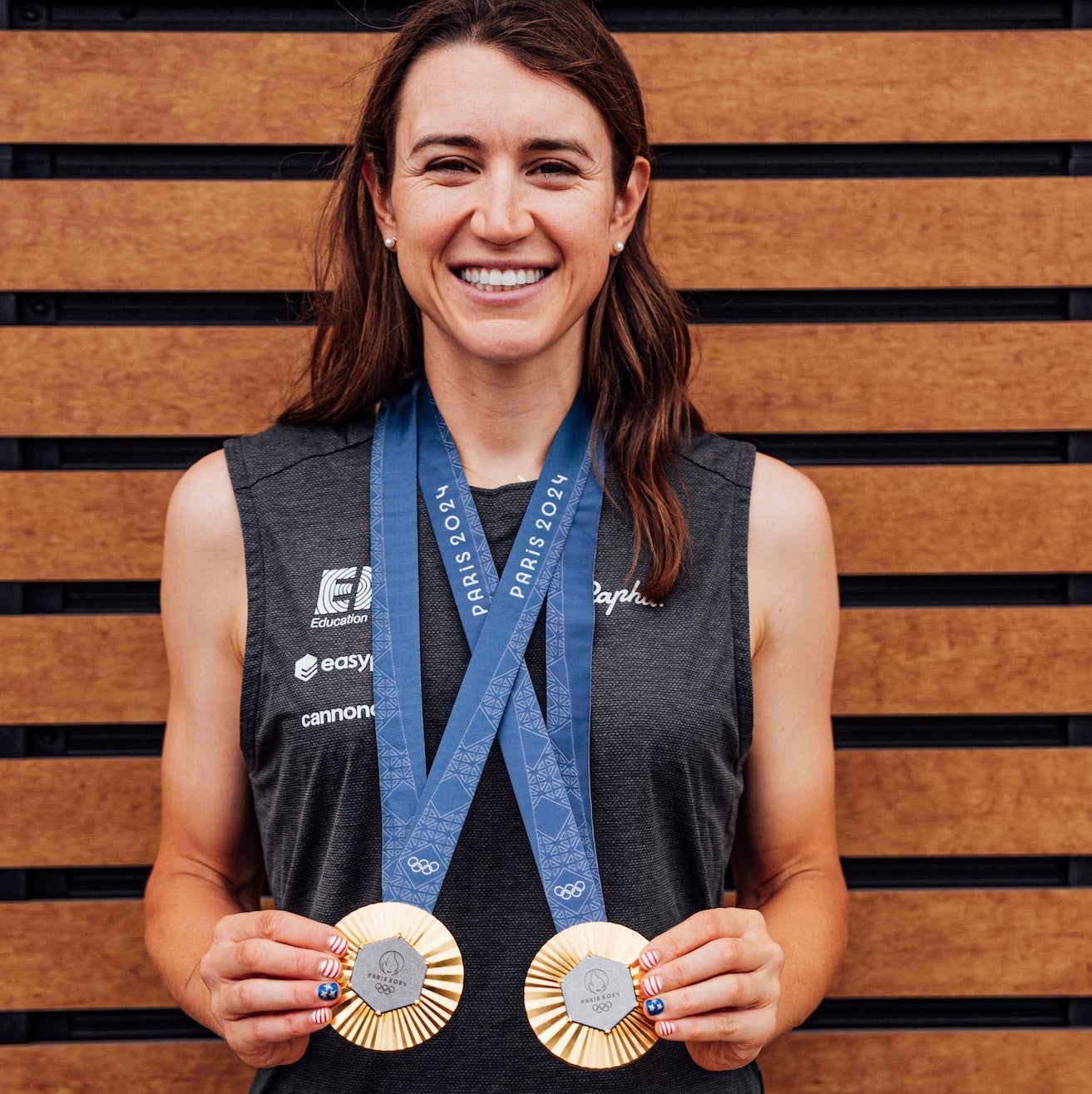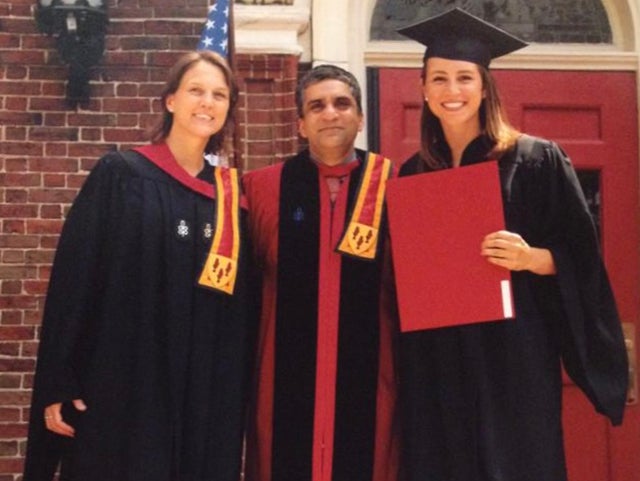
From a borrowed bike to the Olympic podium
Cyclist Kristen Faulkner ’16 turned a new hobby into gold
Kristen Faulkner ’16
Computer science concentrator
Cabot House
The media likes an underdog. When cyclist Kristen Faulkner ’16 won the gold in the women’s road race at the Paris Olympics, stories played up the fact that she hadn’t originally qualified for the race. Spotlights highlighted that she didn’t take up cycling until her twenties when she enrolled in a beginning cycling class in Central Park. What many didn’t include was Faulkner’s thoughtful bid to race and her diligent preparation. She studied the course with flash cards and then executed her strategy flawlessly—an approach familiar to any Harvard student. She followed the win with another in track cycling, becoming the first U.S. woman to win Olympic gold in two different disciplines. Faulkner shares how she thinks Harvard played a role in her cycling success, why she approaches risks with thorough preparation, and what advice she would give to anyone picking up a new skill.
Can you share a bit about your Harvard story?
I was on the rowing team in high school and wanted to go somewhere that prioritizes academics, but also has good sports. I felt like Harvard balanced that well. They treated me as not just an athlete and not just a student but a real student-athlete.
I also was really interested in the startup culture and Harvard had just opened the Innovation Labs. This was so exciting to me. I took my first computer science class, CS50, because I wanted to try something completely new that I'd never done before. I just fell in love with the idea that you could produce something from nothing. It was hard, but rewarding and exciting. When I joined, the initial cohort of women in computer science was just forming. Now there are so many women in computer science, which is so exciting.
How do you think being an athlete at Harvard led to your cycling career?
The aerobic engine that I developed at Harvard really helped me early on in cycling. I think it would have been hard to start cycling so late in life if I didn't have the background in rowing.
You moved to NYC after graduation and started working at a venture capital firm. Can you share what led you to take that cycling class in Central Park?
I'm from Alaska. I really miss the outdoors when I was living in Manhattan. I found that I needed an outlet. When I was at Harvard, I had my rowing. Every single day I could get on the Charles River, get away from classes, and clear my head. And when I moved to Manhattan, I missed the camaraderie of being on a team and the competitiveness that I had in rowing.
I heard about an introductory women's cycling clinic, and my ex-boyfriend encouraged me to go. He lent me his bike, which he had gotten from the host family that Harvard paired him with. So, there was a Harvard connection there too.
Was it something that clicked right away?
When I started, I wasn't thinking that I wanted to be a professional cyclist. I just kept coming back because it made me so happy. When I started doing races, I got hooked and competitive. It flowed from there.
You quit your job to become a professional cyclist. Can you speak a little bit about that decision?
I grew up in an environment where people around me were willing to take risks. My parents moved to Alaska in their early twenties to run a hotel restaurant. They took big risks in their life to start their family and their career. I was raised with this idea that it's okay to take risks as long as I have thought through them thoroughly.
In venture capital, I was working with entrepreneurs every single day who were passionate and took risks to follow their dreams. It forced me to reflect a little bit on my own life. I think it made it a lot easier to take the risk, knowing that I had this Harvard degree, because I felt like if it didn't work out, I could still get a job after.
Can you share the story of how you came to participate in the road race?
I was only going to do the road race if I had a chance at a medal. There was no point in doing it if I didn't think I could because it would tire me out for my race for team pursuit two days later. I had to go to USA Cycling and give them an argument for why I felt I was mentally capable. And in doing that, I had to do a lot of research about the course, about the competitors, about my strategy. They straight up asked me: How are you going to win?
I was a student of the sport. I made flash cards. I studied the course. I prepared so thoroughly for it, and I think that helped. I had a good strategy before the race even started and I was able to execute.
What’s it like being a Harvard alum in the professional racing world?
I think the biggest thing is just the power of the alumni network. I got off the phone yesterday with a classmate. She was also a computer science rower and just published a book. I want to publish a memoir about my Olympic journey. So just being able to reach out and talk to her about that was helpful.
I’m grateful that I had my education before I became an athlete. I feel I can race as long as I want to without additional pressure because I have a Harvard degree. Harvard taught me how to reach out for support, resources, and mentors. And that's really helped me in my career.
I believe you're a supporter of financial aid at Harvard College. Could you share why?

"I was a financial aid recipient myself when I was at Harvard. I wouldn't have been able to go to Harvard if it weren't for financial aid. When I give, I give to financial aid because it feels the most impactful. Some of the most amazing, successful people I met at Harvard were also financial aid recipients. Everyone brought a different perspective. If I can contribute to financial aid, I can contribute to a richer student body."
What other kinds of things are you looking forward to this year?
The world championship at the end of the month in Zurich, which I'm excited for, and I’m doing a few public speaking opportunities this fall. And I’m planning on the Olympics in 2028.
Any advice for a Harvard student—or anyone—who is trying something new?
Don't be afraid to be a beginner. At Harvard, we're surrounded by people who are so talented. We start to think, “There’s no way I’ll ever be as good as them. It’s too late to start.” But I don’t think that's true. Some of the most amazing experiences in my life have come when I was okay being a beginner again and when I stopped comparing myself to the people around me. I just focused on my own journey. It’s never too late.
Credit: Top photo provided by ZW Photography; center provided by Kristen Faulkner.